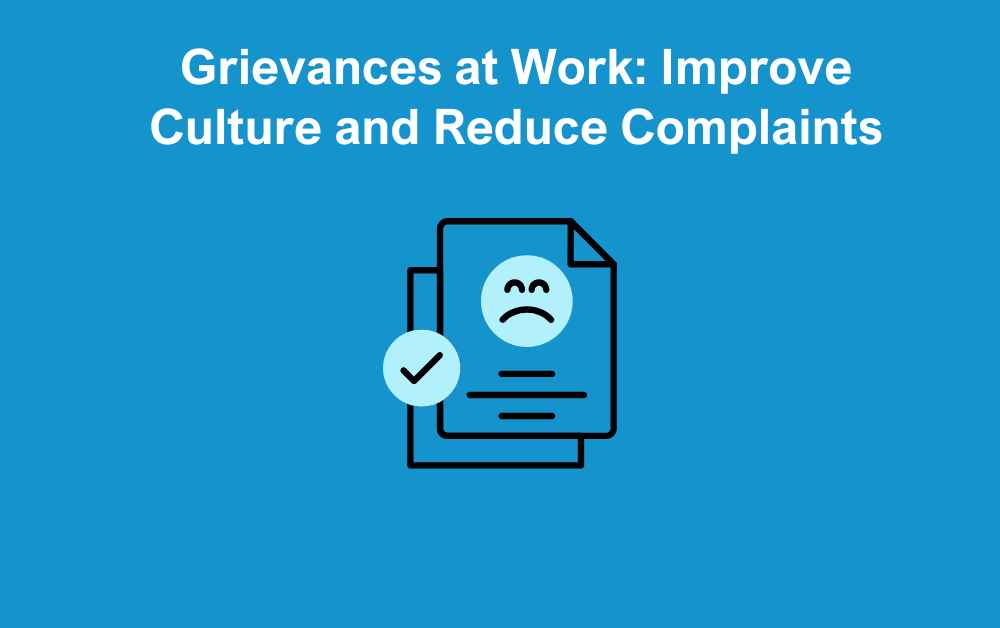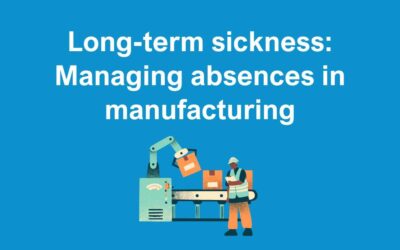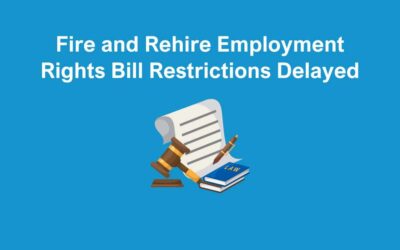In recent weeks, we have seen a significant rise in grievances at work across various industries. There doesn’t appear to be a specific trend, but one common theme is that many employees struggle to accept constructive feedback. While feedback is an essential part of professional development, if not communicated or received well, it can lead to formal complaints that consume valuable time and resources.
Grievances, when mishandled, can have serious implications for businesses, including financial costs, reputational damage, and deteriorating employee morale. That’s why it’s crucial to have a structured approach to managing grievances at work effectively.
Jump to Section:
- What is a Grievance?
- Foster a Culture of Open Communication
- Train Managers to Give and Receive Feedback
- Ensure a Clear Grievance Policy is in Place
- Encourage Early Resolution
- Respond Promptly and Fairly
- Offer Mediation Services
- Monitor Trends and Address Root Causes
- Review and Improve Policies Regularly
- How We Can Help Businesses Manage Grievances at Work Effectively
- Conclusion
What is a Grievance?
A grievance is a formal complaint raised by an employee regarding workplace issues, including concerns about working conditions, relationships with colleagues or management, discrimination, bullying, unfair treatment, or breaches of company policies. Grievances can stem from a variety of sources, such as dissatisfaction with workload distribution, conflicts over performance evaluations, or perceived inequities in pay and promotions.
Employees typically raise grievances when they feel their concerns have not been adequately addressed through informal discussions. If left unresolved, these grievances can escalate, leading to legal disputes, decreased morale, and disruptions in productivity. Therefore, businesses must have a clear grievance procedure in place to ensure that complaints are handled fairly, transparently, and efficiently.
Here’s how businesses can navigate grievances at work efficiently:
1. Foster a Culture of Open Communication
Encourage an open and honest workplace where employees feel comfortable discussing concerns informally before escalating to a formal grievance. Clear communication, regular check-ins, and an approachable management style can prevent minor issues from escalating. Creating channels for employees to share feedback, such as suggestion boxes or anonymous surveys, can also help identify potential concerns early. This is crucial not only to reduce complaints, but to improve company culture.
2. Train Managers to Give and Receive Feedback
One key reason for grievances is how feedback is delivered. Providing training to managers on effective communication, emotional intelligence, and handling difficult conversations can significantly reduce the likelihood of grievances at work. Managers should be trained to give feedback in a way that is constructive, specific, and actionable while also being receptive to concerns raised by employees. Encouraging a two-way feedback system can improve engagement and reduce misunderstandings.
3. Ensure a Clear Grievance Policy is in Place
A well-documented grievance procedure should outline how employees can raise concerns, how the company will handle them, and expected timelines. Ensuring employees are aware of and understand this process promotes transparency and trust. The policy should also highlight the roles of HR, management, and employees in the process and provide examples of issues that constitute grievances at work to prevent misuse of the system.
4. Encourage Early Resolution
Where possible, encourage employees to resolve disputes informally through mediation or direct conversations with their managers. HR can play a crucial role in facilitating these discussions before they become formal grievances. Addressing minor concerns early can prevent escalation, fostering a more collaborative work environment. Providing conflict resolution training to employees can also help them manage disagreements constructively.
5. Respond Promptly and Fairly
If a grievance is raised, ensure it is addressed swiftly and impartially. Delays can exacerbate frustration and lead to further complaints. Following due process, keeping clear records, and maintaining confidentiality are essential for fair resolution to a grievance at work. Employees should feel assured that their concerns will be handled objectively, with clear communication at each stage of the process to avoid uncertainty.
6. Offer Mediation Services
In cases where grievances are complex or emotionally charged, mediation by a neutral third party can help both sides reach a mutually agreeable resolution. This approach often prevents the situation from escalating further. Mediation provides an opportunity for employees to express their concerns in a structured environment while working towards a solution that benefits both parties. Trained mediators can facilitate discussions and prevent further conflicts.
7. Monitor Trends and Address Root Causes
If grievances at work are increasing, it’s worth identifying patterns and addressing underlying causes. Are employees feeling undervalued? Is management communication lacking? Conducting regular employee engagement surveys can provide valuable insights to improve workplace culture. Analysing trends in grievances can help businesses proactively address systemic issues, such as workplace discrimination or ineffective leadership, rather than just reacting to individual cases.
8. Review and Improve Policies Regularly
Workplace dynamics change, and so should company policies. Regularly reviewing grievance procedures, feedback mechanisms, and HR practices ensures they remain effective and relevant. Periodic training for employees and managers on updated policies can improve adherence and understanding. Additionally, seeking feedback from employees on policy effectiveness can highlight areas for improvement.
How We Can Help Businesses Manage Grievances at Work Effectively
Handling grievances properly requires expertise, fairness, and a proactive approach. Our team can support businesses by offering tailored HR solutions, including:
- Grievance Policy Development – We help businesses create clear and effective grievance policies that comply with employment law and best practices.
- Manager Training – Our expert-led training equips managers with the skills to provide feedback constructively and manage disputes professionally.
- Mediation Services – We act as impartial mediators to resolve workplace disputes before they escalate into formal complaints.
- HR Support and Advice – Our team provides ongoing guidance to help businesses handle grievances fairly and efficiently. We can even handle the process for you, where you don’t have the capacity internally, or need some impartial guidance on this subject.
- Employee Engagement Initiatives – We work with organisations to improve workplace culture, reducing the likelihood of grievances at work occurring in the first place.
Conclusion
Grievances are an inevitable part of any workplace, but how they are managed can make all the difference. By fostering a culture of open communication, training managers effectively, and ensuring a robust grievance policy is in place, businesses can handle complaints more efficiently and reduce their occurrence.
If you are experiencing an increase in grievances at work and need guidance on best practices, our team is here to help. Get in touch to discuss how we can support you in creating a more positive and productive workplace.







